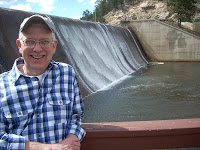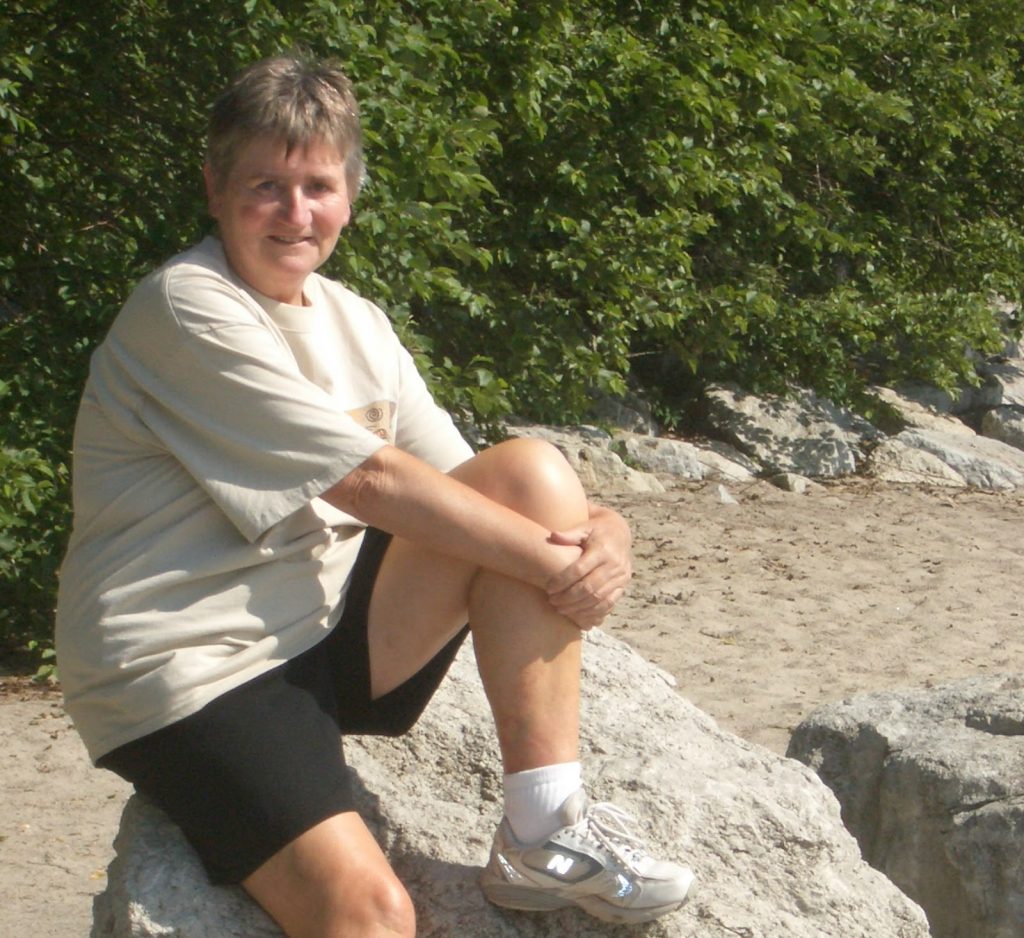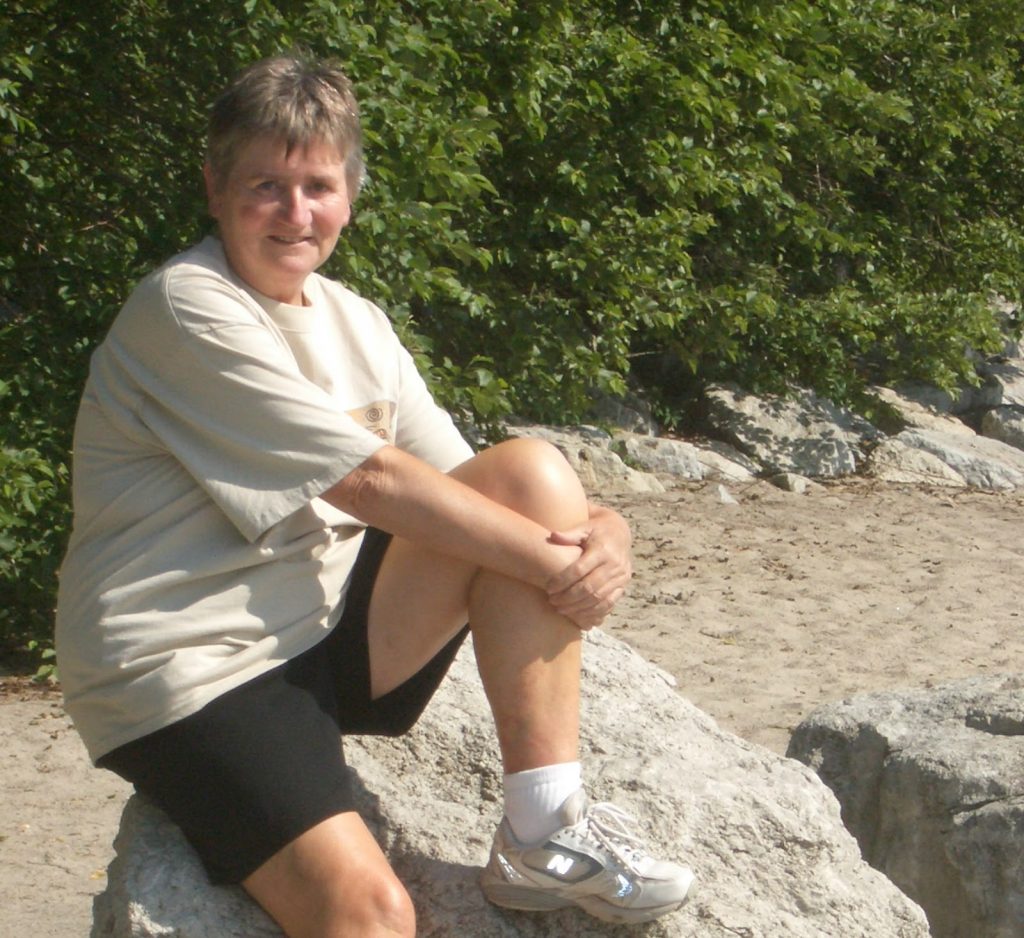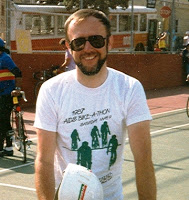When Things Don’t Work, by Phillip Hoyle
many years. I am sure Myrna was trying to have the world’s best marriage, to
live the dream of being the princess with her prince charming to fulfill the
purpose of her mother’s rather unrelenting discipline that focused on making
her a housewife so she could rear and educate children and care for her
husband. So Myrna approached her life as a wife with enthusiasm and talent and
a wonderful attitude.
even though from an early age I was far from straight. I wanted a family not as
the fulfillment of a dream but as a matter of course. How else could anyone
live? I wanted the pleasures and security of family life and so worked in my
way with good humor, consideration, kindness, and reliability to make it
possible. I liked family life with its endless variety—Myrna’s and my family life
spiced up with children, foster children, unusual friendships, and great
tolerance.
little interest in keeping up with domestic bookkeeping. “Would it help you if
I kept the books?” she asked. “Sure,” I replied. I wasn’t into some stereotype.
Perhaps she was since her mother kept the books for the family farm where she was
reared.
our children and the other denizens of our house on Volutsia Street or our
apartment on Las Vegas Boulevard or our rental on Bald Hill Road or the
apartment on Ellis Boulevard or our townhouse on Morris Street or the apartment
at Sixth and Lead or our residence in the basement of her parent’s farm home or
the apartment on Boulder Blvd. I came home every night, twice a month happily
turned over my paycheck, occasionally helped solve domestic conflicts, all this
with joy, calm, commitment, and laughter.
both worked to lessen or avoid conflict, we certainly could talk through, even
argue our different perspectives and come to a mutually agreeable solution.
Neither of us was selfish although I had a much greater capacity for being so
than she. And I had this longtime nurtured gay self that I appreciated and
loved. I didn’t repress my homosexuality but realized that in order to live my life
as a minister in a church I had to sublimate any number of my urges. Still I
found ways to respect this part of myself, and even satisfy some of it without
hurting other people or myself. I was skilled in my duplicity. I was also
always aware that what was gay about me was certainly not hidden. I knew myself
and I knew that others—at least some others—surely perceived this other part of
me.
interesting kids and nurtured many friends and inspired other couples to do
likewise. So why the separation? Why the eventually divorce?
one-on-one life all the distractions and responsibilities of rearing children
lessened. Oh we still had others living with us from time to time, but I finally
could satisfy other needs, and without the children present, I did so. I did
worse than break one clause in our marriage vows: “and keep yourself only for
her.” I broke that vow with other men whom I liked intensely. Feeling the
emotional change in me, Myrna finally let herself see what she’d long known.
Finally we talked, but rushing the matter we were unable to resolve the problem.
Emotion can cause such failure, but the real failure was the institution of
marriage itself.
wish you wouldn’t. Yours was the only marriage I ever thought was worth all
problems.” I thought about her kind words and finally realized the problem was
that no one had ever developed marriage for bisexual folk. Drat.
pain, as did our commitment to our children, grandchildren, and many
friendships from our married days. Marriage as a reified institution with a
long history of mythology and law to bolster it eventually didn’t work for us. No
matter how hard we both tried. Still what brought us together in the first
place—friendship and love—continues to flourish between us.
2014
lives in Denver and spends his time writing, painting, and socializing. In
general he keeps busy with groups of writers and artists. Following thirty-two
years in church work and fifteen in a therapeutic massage practice, he now
focuses on creating beauty. He volunteers at The Center leading the SAGE
program “Telling Your Story.”
When I Decided by Gillian
perfectly honest with myself, (if that is even a possibility for me or for
anyone, but I do my best,) I fear that there are few, if any statements, at
least with reference to my earlier years, that I could make beginning with those
words. At least if I did, they would all end up like this; “When I decided ….
whatever …. I didn’t
really decide at all but just drifted along due to inertia. Or, was swept away by emotion. Or, Let someone else decide for me.”
always thought I made decisions, but looking back I’m not so sure. Much of the time they certainly
did not add up to what I truly consider to be active decision-making; weighing
the odds, listing the choices, analyzing the figures. At best they were passive
decisions, if decisions at all. In my own defense I must say that I never
simply tossed a coin, but maybe even that would have been more pro-active. At
least the coin toss acknowledges that there is in fact a decision to be made. With
me it was often as if I spaced out the necessary decision completely, and, as
if sleepwalking suddenly woke up in a new situation. And to top off this sad
tale of inadequate thinking, it appears to me that sometimes when I did
actually decide something; it was for the wrong reasons. I have been mighty
lucky, then, that most changes I have drifted or been dragged into, have been
very positive.
college. A good decision made, admittedly subliminally, in order to fix this
queerness I did not even acknowledge having. The men there would be different
from the farm boys at home. I would fall madly in love and live happily forever
after without this unidentified thing eating away at me. A great
decision, my college days were among the happiest in my life, but made for
completely the wrong reason. I hadn’t
been there a week before I fell madly in love with a woman in my class.
with another woman, who one day casually tossed out the suggestion that we go
to the United States for a year. “OK,” I shrugged, and that was the extent of my
decision-making. Had she suggested an excursion to the South Pole I would have
responded in the same way. Talk about decisions for the wrong reasons! And
letting someone else make them for you.
casual, as well. I had trailed my ineffectual self around the U.S. in my
inamorata’s
wake, ending up in Houston where she married a very rich and mighty cute Texan,
which put an end to me as her shadow. I might as well start saving the money to
return to England, I thought, gloomily. The new unwanted man in my life had a
friends in Denver and said I should see Colorado before leaving the U.S.
to go to work for IBM, where I remained for 30 mostly very happy years. I
was working at Shwayder Brothers, later to become Samsonite, when the guy
working next to me said that if I wanted some quick bucks to get myself home, I
should apply at IBM, which at that time was rapidly filling it’s new plant in Boulder with just about anyone
walking in off the street. What an opportunity. It’s difficult in this day and age even to
imagine such a thing, never mind remember the actuality of it. But I don’t recall finding the prospect exciting at all.
permanently, but again I have little recollection of actually making a
conscious decision to stay in Colorado, for all that I recognized I had found
God’s country. It was more a case of
drifting: allowing nothing to happen. In the absence of decisions, the status
quo remains.
product of non-decision. (Which is, by the way, nothing like indecision,
which implies at least some attempt to make a decision.) I simply
drifted effortlessly into the vacuum created by my future husband’s needs.
is, there was no decision involved at all. I was picked up by the cowcatcher of
a runaway train and away I went. I couldn’t stop it and I couldn’t
get off.
me firmly on the ground at it’s
destination, I of course had to leave my marriage. And it was as a result of a
very conscious decision that I left. Not long after that, I came out to
everyone else in my life; another conscious decision. When I asked Betsy if she
would consider actually, really, legally, marrying me last year, that again was
a serious decision.
to myself, in my early 40’s,
I wasn’t myself. I was an actor plugging
along on the stage of life, playing me. But I was not me. At some
deeply-buried intuitional level, I always knew this. So what did I care what
that person playing me did; where she went or how she lived? Why bother making
decisions about what moves this person, in some ways almost a stranger to me,
makes?
real me. The actor was gone. From then on, of course it mattered what happened
to me. ME. MYSELF. The original. The one and only. You talk about being born
again! Suddenly, in middle age, the real me was born. And I am important to me.
I care for me. I make decisions very carefully for me. I most emphatically do
care what I do and where I go and how I live. Finally and forever, I am me.
alive who is Youer than You.”
Dr. Seuss
was born and raised in England. After graduation from college there, I moved to
the U.S. and, having discovered Colorado, never left. I have lived in the
Denver-Boulder area since 1965, working for 30 years at IBM. I married, raised
four stepchildren, then got divorced after finally, in my forties, accepting
myself as a lesbian. I have now been with my wonderful partner Betsy for 25
years.
Do I Have Your Number…. ?? by Gillian
Do I have your number? No, I do not mean your phone number! I use the phrase in the way we say, or just think to ourselves, ‘Oh yes, I’ve got your number!’ meaning ‘Oh yes, I know what you are after, I know what is going on here, I know what you think and what you want; I know what you are about. I know who you are.
So, in that sense, do I have your number? Do all or any of you have mine? We have shared many of our most heartfelt emotions, thoughts, and ideas, over the last two or three years. We have held nothing back. We have laughed and cried together. We have hidden nothing from each other.
Still, I don’t know you, and you don’t know me. It makes me wonder if really deeply knowing someone, completely understanding them, is actually possible. Surely very few, if any, family members truly know each other, even those who consider themselves to be very close. After twenty-six years together, and with considerable help and spiritual guidance from such people as Eckhart Tolle, do Betsy and I really really know each other? Of course not. We still struggle to understand each other every single day, with mixed results.
But how can I even dream of a deep and flawless understanding of any other person when I still don’t know my own self? I try. I look deeply inside myself and try to interpret correctly what I find there, but I don’t always get it right. After all these years, I can still surprise, perhaps even shock, myself.
Some time ago our group’s topic for the week was Marriage. Some of you remember that my piece had the recurring theme: “marriage doesn’t freakin’ work!” I questioned why we, the GLBT community, are so determined to jump onto this faltering band-wagon.
Last week came the staggering announcement that the IRS now recognizes same-sex marriages. Perhaps Betsy and I should consider marriage, after all. But only, I firmly lectured my inner self, for purely fiscal reasons. After all, I insisted, we had no emotional need for any such thing. We are as committed to each other and our relationship as any two people could ever be, and we don’t need any official sanction to help us along.
So why on earth did I find myself, close to tears, asking Betsy if she would consider marrying me? In fact, I became so obsessed with the idea that I kept on asking. I guess I couldn’t quite believe the answer. Finally the poor beleaguered woman laughed,
“You’ve asked me three times and I’ve told you ‘yes’ three times. OK?”
Not the most romantic response, but I’ve finally got it; the answer is YES!
I am completely taken by surprise to find myself so thrilled at this that I feel almost sick with excitement, something we do not experience too frequently once we leave the uninhibited emotions of childhood behind us. Suddenly this is all about love and nothing about money; much more peering inside myself to be done!
No, I don’t have your number. I don’t even have my own!
September 2013
About the Author
I was born and raised in England. After graduation from college there, I moved to the U.S. and, having discovered Colorado, never left. I have lived in the Denver-Boulder area since 1965, working for 30 years at IBM. I married, raised four stepchildren, then got divorced after finally, in my forties, accepting myself as a lesbian. I have now been with my wonderful partner Betsy for 25 years.
Marriage by Will Stanton
woman marrying a woman. It ain’t right;
it ain’t natural. Marriage should be
between one man and one woman, just as it always has been for thousands of
years! Ah believe in traditional
marriage!”
At least those people who hold such beliefs and who make such statements are consistent : they generally are ignorant of the facts concerning most things. Facts mean nothing to them. Throughout history, so-called “traditional marriage” has not been anything like what these people say. On the contrary, usually marriage has been quite different.
In most early societies, marriage was a private agreement between two families. Neither the Church nor the State had any say in the matter. Of course now-days, a bride’s family is shirking its duty if they do not provide the groom’s family with a number of sheep or horses.
Often, not even family-consent was necessary for marriage. Two people who simply regarded themselves as being married were viewed by the Church as having a valid marriage, provided neither one was a slave of course. It was not until 1754 that England preferred to have couples obtain a marriage license, although that was not regularly enforced. Even in socially backward countries such as America, authorities initially simply inferred marriage from a couple’s behavior rather than requiring either a license or a church wedding. Just living together was all that was needed.
Considering that so many “good Christians” would like to alter civil law to conform to their religion, they would be upset to learn that the type of marriage most often mentioned in the first five books of the Old Testament was not one-man, one-woman, but instead was one-man, several-women. So, in today’s “traditional marriage,” how many women should a man be allowed to marry?
If a man chooses only one woman to marry, then he is allowed to either divorce his first wife or add another wife or concubine if the first wife does not produce a child. After all, producing offspring is the only reason to marry; no one else should want to marry.
Early Christian records document some same-sex marriages. It is said that, in the 4th century, Saint Sergius and Saint Bacchus were united in a church service. They even are portrayed close, side-by-side in a religious icon.
When the Church later promoted two-person marriages, the Church would nullify a marriage if the man was impotent, but not if one of the spouses was sterile. One wonders to what extent the Church went to determine which was which. In 18th-century Ireland, one aristocratic lass insisted upon marrying the great castrato singer Tenducci, only to employ the law of the time to divorce him when she discovered the greater pleasures of a fully intact man. The New York Court ruled in 1898, however, “It cannot be held, as a matter of law, that the possession of the organs necessary to conception are essential to entrance to the married state, so long as there is no impediment to the indulgence of the passion incident to this state.” So apparently, two guys who are partners don’t have to keep trying to make babies.
Only in more recent times have American legislatures and courts felt obliged to intrude upon what has been, in truth, real traditional marriage. Black slaves in America could marry, but only with the permission of the slave owner. By the 1920s, thirty-eight states had laws prohibiting marriage between whites and blacks, Mulattos, Japanese, Chinese, Indians, Mongolians, Malays, or Filipinos. Twelve states prohibited marriage to a “drunk” or “mental defective.” There even was a prohibition to marrying any (quote) “drunkard, habitual criminal, imbecile, feeble-minded person, idiot, or insane person.” If we adhered to this “traditional” concept of marriage today, that would eliminate the right to marry to most members of the GOP and all of Fox News.
In conclusion, and to paraphrase conservative pundit George Will, what is the cost / benefit of so many Americans believing in, and subscribing to, the hate-filled, irrational rantings of so many so-called “good–Christian” politicians, voters, and preachers? The cost to American society, and especially to the civil rights of GLBT citizens, is clear. But, I see no true benefit from having millions of Americans standing foursquare with bloviating ignoramuses. The recent statement by a North-Carolina, Baptist minister who said, “Ah could just puke! Can you imagine kissin’ a man?” is redundant proof that high authority allows for someone of extremely low IQ to insert himself into the debate concerning human civil rights.
© 01 June 2012
About the Author
stories. I also realize that, although my own life has not brought me
particular fame or fortune, I too have had some noteworthy experiences and, at
times, unusual ones. Since I joined this Story Time group, I have derived
pleasure and satisfaction participating in the group. I do put some
thought and effort into my stories, and I hope that you find them interesting.
Life After Truth by Carlos
I have been outed!
My partner, Ron, and I solidified our relationship on May 1st, entering into a civil union within hours after Colorado enacted them. In preparation for the historical event, we had our tuxedos dry cleaned, purchased new wristwatches to signal a new dawning, and planned a private celebration. I found myself strangely calm, that is until hours before the ceremony when I couldn’t cinch my cummerbund or tie my shoelaces. Suddenly, I understood why some people metamorphose into terrors just before their big day. It was becoming real. After all, I was committing to one man for a continued lifetime of discoveries…in real time.
Upon been ushered into the Wellington Webb Building, I inexplicably unleashed all fears, all doubts, all anxieties, and I became child-like with anticipation. Dignitaries congratulated the couples; families and supporters whooped it up; even tired agents at the Clerk and Recorder’s Office maintained genuine smiles of inclusiveness, conveying this was our day to declare that we in the LGBT community were taking another step closer toward full-fledged citizenship. I realized this was a victory in spite of it not offering full marriage rights.
Being so dapper, and hopefully so cute, every reporter wanted to photograph and interview us. Though we have never been in the closet, admittedly neither have we worn our relationship on our sleeves. That morning, we kicked the closet door open and agreed to every photograph, every interview. Only one reporter was ingenuous, an interviewer who forgot to mention she represented a conservative religious publication. Initially, her questions were innocent enough, perhaps to lull us into complacency. However, my suspicions were aroused when she queried us about whether the legalization of civil unions could in time lead to marital contracts by blood relatives or parties of three or more, arguments that have been used by homophobic institutions to prevent our forming legal families. I caught a whiff of the dankness from the rock from which she had crawled. Upon learning of the organization she represented, I unleashed a diatribe of impunities, informing her in no uncertain terms that as a former believer, I had long ago rejected its patriarchal, sanctimonious, we-are-the-chosen-of-God attitudes. To her credit she stayed in place as I defined the difference between those of us who embrace our spirituality and those of her belief who cater to their religiosity. I informed her that my unconditionally-loving God, was present and, no doubt, was at that moment dancing an Irish jig to a Mexican marimba band while singing in key of his sons and daughters whom He loved and validated and in whom He was well-pleased. I felt victorious as she slithered away, although I doubt that anything within her doxology had changed. After all, oppressors never see themselves in need of transformation, never realizing that bigotry wrapped in prayer is still bigotry. It is for us, the former oppressed, to raise our voices and our fists and repudiate their canons. Only when they feel the ire and the tension of our convictions, do they relinquish their self-appointed power…and then only grudgingly.
When Ron and I were finally ushered into the magistrate’s arena, my stalwart, stoic bravado betrayed me as tears bubbled up in the corner of my eyes, and we solemnly repeated our vows and exchanged rings. It was finally real; it was now official. Reflecting over the last few days, I feel different. For some reason that I am only now beginning to understand, I feel so much closer to my beloved. Our union bonded us as though we were enveloped in a lotus of love.
The next morning I was awakened by the ringing of the phone. Groggily, I answered. Friends were calling to inform us that our pictures of the night before were posted on the internet. My initial reaction was one of nothing-good-can-come-from-this, much like Howard Brackett’s reaction when outed in the romantic comedy In and Out. Apparently, people we have influenced throughout the years were heralding our exodus from behind the closet door. We had been fully outed, no ifs, ands or buts. Therefore, we accepted the inevitable, recognizing that in spite of ourselves a new chapter was opening up in our lives. There was little to do except be grateful for an act of synchronicity. Anonymity was no longer an option. Thus, we accepted our outing with courage, knowing honesty and love can never be wrong.
A new sun has truly arisen, and something good has emerged from it. Therefore, let us live our lives as though we have been outed. Let us finally be free, free, free. Let the echoes resonate in every nook and cranny as we slam the closet door behind us and build a new foundation for a brave new world.
About the Author
Cervantes wrote, “I know who I am and who I may choose to be.” In spite of my constant quest to live up to this proposition, I often falter. I am a man who has been defined as sensitive, intuitive, and altruistic, but I have also been defined as being too shy, too retrospective, too pragmatic. Something I know to be true. I am a survivor, a contradictory balance of a realist and a dreamer, and on occasions, quite charming. Nevertheless, I often ask Spirit to keep His arms around my shoulder and His hand over my mouth. My heroes range from Henry David Thoreau to Sheldon Cooper, and I always have time to watch Big Bang Theory or Under the Tuscan Sun. I am a pragmatic romantic and a consummate lover of ideas and words, nature and time. My beloved husband and our three rambunctious cocker spaniels are the souls that populate my heart. I could spend the rest of my life restoring our Victorian home, planting tomatoes, and lying under coconut palms on tropical sands. I believe in Spirit, and have zero tolerance for irresponsibility, victim’s mentalities, political and religious orthodoxy, and intentional cruelty. I am always on the look-out for friends, people who find that life just doesn’t get any better than breaking bread together and finding humor in the world around us.
Three Little Words by Phillip
So we heard in the fifties; archaic expressions to bolster old-fashioned values. We didn’t think how the song was a commercial jingle rather than a poetic and musical reflection on human activity. It was show music for comedy. The simplicity of the words belied the complexity of the relationships, even the ones being portrayed on the screen. But this fanciful appeal to the medieval literary tradition of romantic love with its Lords and Ladies, royalty and riches, princes and princesses, troubadours and trouveres, lutes and loyalties, knights in shining armor riding trusty steeds and hoping to win the attention of the most important Lady of the realm; scenes from movies with white dresses, tiaras, and happily ever afters. It’s a dream of Edenic idealism based on the combination of three little words: I love you.
Back when I was nineteen, my girlfriend manipulated me into saying those words to her. Of course I had heard the words in movies, but not in the house in which I grew up. I had no doubt I was loved appropriately by my parents and that they loved one another. Their actions showed these truths. Still, they didn’t go around saying it. In fact, few people I knew said the words which were were groan words for us boys watching movies. We so hated that romantic syrup, and thus I was unprepared to say it to my girlfriend. With great difficulty I played my part in the fantasy and finally stuttered out, “I love you.”
Analytical logic demands that I was unprepared because what I felt for her was something other than love. Oh to understand the relationship between words and feelings, something that’s always been difficult for me. Anyway, I did learn to say the three words in combination to my girlfriend. I believed them although the feelings I had were more related to sexual hopes than falling in love.
So I married the woman who taught me to say “I love you.” I practiced and practiced. I loved her in practical ways that made for a fine marriage. We liked and respected one another. We treated one another with kindness and love. I didn’t use the words to manipulate, but I did employ them daily. I taught them to my children. I was judicious in their use, and when I fell in love with a man, I didn’t use them with him for quite a few years. Eventually, I signed my letters to him, “Love, Phillip.” He never fell into line with my practice; so I noted. We never talked about love. I came to love other people as well—women and men. I said the words to a few. One young man said them to me. I explained my perspective, that these words can never mean the same thing to two people. Feeling meets feeling. What fantasies arise from such feelings need to be handled with caution should a couple of people want their sexual attraction and deeper affection to grow into a lasting relationship.
Gay male romance may focus more on “Harder, deeper, faster,” than on pledges of “love and marriage”, yet even “Harder, deeper, faster,” is a convention not original to gay men. It surely became a focus due to the combination of two testosterone-laden individuals getting together sexually. These days modern gay experience does play with hopes of love and marriage in a growing movement for equality before the law. Perhaps American gay men want to say to one another “I love you harder, deeper, and faster.” Still love, words of love, and that potent combination of I, love, and you have a long history, and most American relationships want it to become personal.
Words have creative potential. It’s an old tradition from any number of cultures. The ancient Hebrews believed in such creativity. For them, Yahweh called into existence the moon and stars, earth and innumerable varieties of life forms. God spoke. It’s a metaphor with great power in the imagination.
Shall we not sing the possibility of creative love? After all St. Valentine’s Day falls tomorrow and creative love is a romance, one to pursue in both feelings and thoughts. Perhaps we need to approach “I love you” with the realism of my late mother-in-law who advised her daughter about sex in marriage: “You’ll get used to it.” Yet even this practicality didn’t mitigate her daughter’s fairy tale fantasy about marriage. The advice probably did help her survive the separation and the divorce that ended it.
Denver, 2012
About the Author
 Phillip Hoyle lives in Denver and spends
Phillip Hoyle lives in Denver and spendshis time writing, painting, giving massages, and socializing. His massage
practice funds his other activities that keep him busy with groups of writers
and artists, and folk with pains. Following thirty-two years in church work, he
now focuses on creating beauty and ministering to the clients in his practice.
He volunteers at The Center leading “Telling Your Story.”
Read more at Phillip’s blog: artandmorebyphilhoyle.blogspot.com
Till Death Us Do Part by Nicholas
married. Through all the debate over gay marriage, we never felt really drawn
to it. We never thought about going to Massachusetts or to Canada as friends of
ours had to get hitched. We didn’t jump onto an airplane in February 2004 and
head to San Francisco when Mayor Gavin Newsum started issuing marriage licenses
and Jamie’s mom inquired as to whether or not we would—as I’m sure she deeply
wished. Long active in the struggle for gay marriage, she had flung herself
into that fray by driving up to the city from Menlo Park to volunteer as a
witness for couples who showed up at San Francisco City Hall. Her fondest hope
was to see her gay son married someday.
like to marry but only when it became immediately and practically real where we
live—in Colorado—and that did not look too likely in our lifetimes. We knew who
we were and we were confident about our love for and commitment to one another
so until legal realities caught up with our reality, we stayed home.
arrangements available to protect our relationship. We had our last wills and
testaments, legal powers of attorney, medical directives, medical powers of
attorney, house ownership agreement, and even, our official certificate of
domestic partnership from the City and County of Denver. We even carry these
documents with us in our cars should we ever need them in an emergency without
time to go home and retrieve them. We were set.
might challenge us as to whether any of our documents and legal constructions
would work. Because, of course, we weren’t married.
Married couples don’t ever have to produce legal documents to justify
themselves.
Supreme Court ruled that the State of California had no justification to
prohibit the marriage of two people of the same gender. It amounted to
discrimination. California was liberated.
instant response was: Let’s go home to California, where we used to live and
still had family and friends, and get married.
visiting friends and relatives and my big worry was that she, with her activism
for marriage equality, would start lobbying for her son and prospective
son-in-law to do the wedding march ASAP. That, I feared, would only spark
Jamie’s resistance—we had so often said that marriage was not for us until some
unspecifiable time in the future, i.e., probably never. And there’s nothing
like a nagging mother to produce a quick “No.”
short circuit what I imagined to be my mother-in-law’s certain campaign. Yes,
he and mom had heard the news and talked about it, he said. But, no, she hadn’t
been urging him/us to wed. She must really want this to happen, I thought;
she’s laying low. The motherly artillery was for now quiet.
to go to California and get married, the closest to a proposal I’d ever make.
And he replied, to my surprise, that, yea, he would, the closest to a yes, I’d
ever hear.
feelings toward getting married. We still would gain nothing in the state where
we lived. In fact, marriage was still as legally empty for us as it ever was.
Nothing would change. Maybe because we met and lived together in San Francisco
before moving to Denver and still had family and friends there and are always
going there that California is still was kind of home. It just felt like the
right thing for us to do. And that’s how we entered the dazzling world of
wedding planning. We were going all the way—a church wedding and catered
reception. Mom was paying.
seconds. I’ve heard all the jokes—and told them—about marriage being a
wonderful institution but who wants to live in an institution. I guess we just
gave into the romance of the idea. Isn’t that why people get married
everywhere? It’s the romance, never mind the legal goodies, which, after all,
we now qualified for in at least 6 states and the District of Columbia. Of
course, we were also entering a legal Alice in Wonderland as to which rights we
had depending on which geographical location we were in. We could get bigger
and then we could get smaller.
we were both kind of surprised that it did seem to make a difference. We began
to think of ourselves in different terms as more than a couple, but a
recognized and sanctioned couple. It isn’t just straight people who have to
adjust their idea of marriage to include gay and lesbian couples. Now that we
have something we never in our wildest imaginations thought we would ever have,
we too wonder what this means. Are we changing the definition of marriage, like
the gay-haters say? Well, I hope so.
Spouses? Husbands? I don’t like the term “husband”—it implies there’s a “wife”
somewhere—but it does spell it all out in just one word and we’ve come to use
it. We love each other, we’re committed to each other, we share property, we
can make decisions for each other, and we have sex. No explanations are needed
as to who my “friend” is.
There’s a catch, though, Here’s the catch. We can’t get divorced. Anyone can go to California and get married. Only legal residents of California can use divorce court. We’re not residents. So, we are stuck. Stuck with each other for life. But that’s just where we want to be.
About the Author
grew up in Cleveland, then grew up in San Francisco, and is now growing up in
Denver. He retired from work with non-profits in 2009 and now bicycles,
gardens, cooks, does yoga, writes stories, and loves to go out for coffee.
Marriage by Gillian
… FREEKIN’ … WORK!!
recovering alcoholic. In his day he was just one of several local drunks. The
fact that he no longer touched the booze seemed to be ignored and he was still
thought of as a drunk by neighbors and family alike. Certainly my grandmother
never gave him any credit, or even acknowledgement, for having quit.
that they had owned when my dad was a little boy, and had to settle for moving
to the cold dark damp dreary dwelling I lived in as a child.
his armchair beside the fireplace which rarely had a fire in it, hour after
hour, doing nothing.
been there.
endless litany of complaints about my grandfather.
in human relationships.
… FREEKIN’ … WORK!!
endless hours in the kitchen in a faded flowered apron, and my Irish maternal
grandpa was one of the delights of my youth. He was a stonemason, creating
gravestones from the local marble. I loved to sit and watch him, and
occasionally I was even allowed to help. He sang or whistled while he worked,
or regaled my juvenile ears with endless fantastical tales in which I doubt
there was an ounce of truth.
was light and warm with welcome, and different in every way from that of my
other grandparents.
far as I could tell.
home.
of each other, before I was born.
parent, more frequently the mother, to blame the other, not from any logical
reason but because they have a huge need to hate someone for the dreadful thing
that has happened, and raving at God or a disease is just not personal enough,
not close enough, not cathartic enough.
as I remember my mother’s inexplicable seething hatred constantly simmering
just beneath the surface, and frequently erupting, ostensibly over minor
things.
you just soldiered on.
believe, also have ended in divorce had that been the ready option it is today.
I did have one uncle whose fifty years with the same woman seemed to be
mutually rewarding, but ironically we discovered, after his death, that they
were in fact never married at all.
particularly positive view of marriage.
that MARRIAGE DOESN’T FREEKIN’ WORK!!
I was NOT gay?
so even without that teensy wee
detail of my suppressed homosexuality, our marriage was doomed.
you go…
divorce.
world????
fifty percent success rate?
chance of ever reaching its destination?
sea, when …
in fact marry if the opportunity arose. (Not a question we are likely to have
to answer in our lifetime, I think, though I do believe it’s coming.)
fiscal considerations, but certainly not for spiritual reasons.
institutions.
our hetero brethren
relationships that actually work.
sanction.
could shine a light to guide the het-set out of the darkness they have created?
become a better place.
from the Dark Side, marching down Broadway.
About the Author
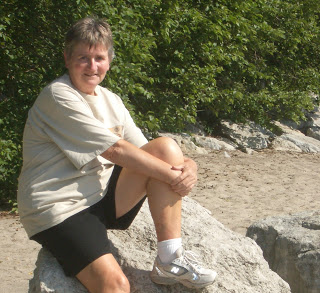 I was born and raised in England.
I was born and raised in England.After graduation from college there, I moved to the U.S. and, having discovered
Colorado, never left. I have lived in the Denver-Boulder area since 1965,
working for 30 years at IBM. I married, raised four stepchildren, then got
divorced after finally, in my forties, accepting myself as a lesbian. I have
now been with my wonderful partner Betsy for 25 years.

